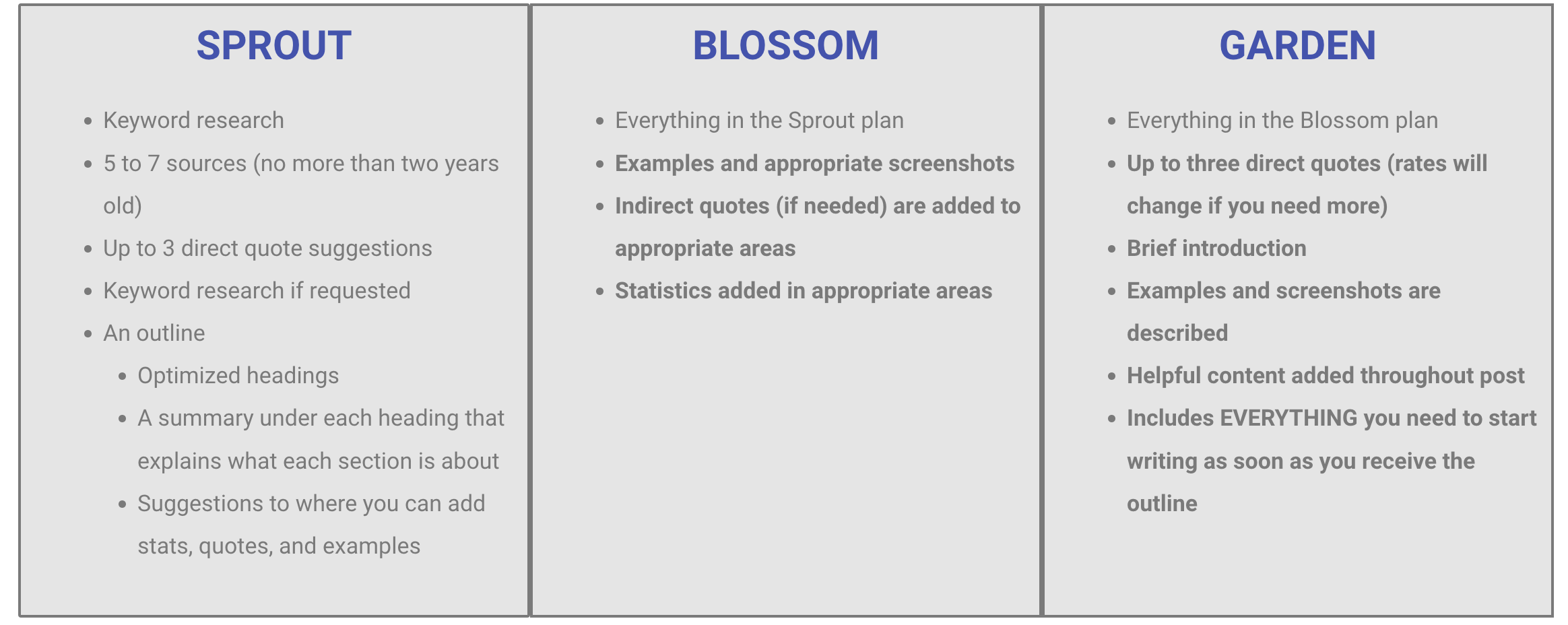Sometimes, when you sit down to write something (especially if it’s long-form), getting started can feel incredibly overwhelming.
You know where you need to end up with the finished product, but…where to even begin!?
Over the past nine years of doing this type of project week after week, here’s what I’ve come up with that makes getting started (and finished!) a far less daunting task.
Building a dump doc
The blank page is NOT your friend.
To get past that blaring white screen and its mocking cursor, start making a (very messy) document with the foundational pieces of what you’re working on. I suppose this would be what some call the research phase, but to be frank, research, to me, sounds like a tidy and organized process. This, on the other hand, is a little…chaotic.
When I’m building my “dump doc” (as in, just dumping things into a doc, like a brain dump), I’m not focused on getting pieces organized yet. That's what I do during the outlining process.
During this part, I’m just gathering pieces in one place so I can come back and organize them later.
My dump docs usually include:
Links to similar types of articles for inspiration
Results in Google’s “People also ask” feature for SEO heading guidance
Any company research/findings I need to include
Interesting POVs or anecdotes from Twitter I find related to the topic (this is often a jumping-off point for finding subject matter experts I want to speak with about the topic)
Stats/data points
From there…
Once I have a decent amount of information in the document, I can begin to move the puzzle pieces around, and the article takes shape quickly.
That said, the dump doc-building phase is the heaviest lift, by far. It takes the longest because while I’m pulling this all together, I have to be mindful of:
Finding recent/current information that’s relevant to my specific search query
Getting credible stats from quality sources
Staying away from rabbit holes and opening endless tabs on my browser
Balancing conflicting data sets and painting a full, accurate picture of the topic
I know my fellow writers can relate, because when I asked: “What's the most frustrating part of the research process as you work on writing content?”, I got responses like this:
You’ve got options!
The good news is that there are OPTIONS for making this process more efficient and far less time-intensive. The right one depends on how you work best, but here are a few things that are helpful.
1. Waldo
This ad-free Chrome extension makes the normal Google search process way more efficient (to me, it’s like Superhuman, but for Googling.) I use it to get more targeted search results with its search "lenses" that let you narrow down search results to cut through the noise and clutter of Google’s ordinary search results (so I find exactly what I need in about half the time.) Also…it’s FREE.
2. PrimoStats
Tired of hunting down the source of a stat that’s been linked to in 32,235 different listicles, only to find it’s actually from 2002 (and therefore no longer relevant)? PrimoStats helps you find stats with original data sources. There’s a free version with access to 1,000 stats, or there’s a paid version that gets you access to more than 15,000 stats. Bonus points that it’s female-founded by a marketer I’ve known and admired for years!
3. Jessica Pereira’s research-as-a-service offering
If you’re a writer who does not enjoy the research process and wants to outsource that aspect of the process completely, the good news is: That’s what Jessica does. While she’s currently on maternity leave until November, she offers a done-for-you service where she’ll do the legwork of creating an organized, reliable dump doc (so all you have to do is build it into the full narrative.)
In summary
The bottom line here: If you can build a dump doc, your writing assignments will only get easier and less stressful. I’ve found it keeps me from procrastinating, it helps me get greater clarity around the topics I’m working on, and in general, it makes the entire writing process much more efficient.
See also: No more writer's block.
Use tools that help you work smarter (not harder), or if you hate researching, consider outsourcing it completely. You’ve got the playbook and the toolkit; all that’s left to do is to put it to good use.
This blog post is brought to you by Harlow. Harlow helps freelancers get organized, save time, and look professional with automated invoicing, proposal templates, and much more—all from one centralized hub. Learn more now!








